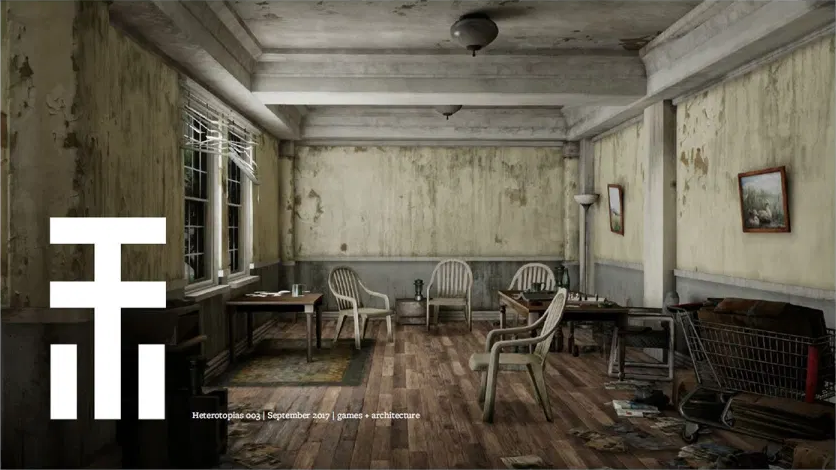E-book, 137 pagine
lingua English
Pubblicato il 01 Settembre 2017 da HeterotopiasZn.

E-book, 137 pagine
lingua English
Pubblicato il 01 Settembre 2017 da HeterotopiasZn.
How do game spaces reflect back on reality? This is the central question of Heterotopias 003, which seeks to make a connection between the issues of our society and their representation in the virtual spaces in which we play.
003’s cover feature discusses The Last of Us, revealing its vacant, overgrown rooms in an original photo series and connecting the game’s depictions of nature to the state of environmental crisis that defines the Anthropocene. Is its post-apocalyptic landscape a poetic warning or a fantasy of erasure?
Alongside this are pieces that unpick imminent issues through the lens of games. In “Bathrooms Without Bodies”, Matt Margini investigates the implicit gender, sexual, and racial politics of videogame bathrooms, while Mirror’s Edge Catalyst is aligned with issues of inequality and absence in urban space in an essay titled “The Empty City.” Elsewhere, Sean Han Tani, developer of Even the Ocean, turns his eye …
How do game spaces reflect back on reality? This is the central question of Heterotopias 003, which seeks to make a connection between the issues of our society and their representation in the virtual spaces in which we play.
003’s cover feature discusses The Last of Us, revealing its vacant, overgrown rooms in an original photo series and connecting the game’s depictions of nature to the state of environmental crisis that defines the Anthropocene. Is its post-apocalyptic landscape a poetic warning or a fantasy of erasure?
Alongside this are pieces that unpick imminent issues through the lens of games. In “Bathrooms Without Bodies”, Matt Margini investigates the implicit gender, sexual, and racial politics of videogame bathrooms, while Mirror’s Edge Catalyst is aligned with issues of inequality and absence in urban space in an essay titled “The Empty City.” Elsewhere, Sean Han Tani, developer of Even the Ocean, turns his eye to the value of lo-fi representation, and Ed Smith looks back at Suda 51’s magnum opus, Killer 7, and finds a powerful symbol for the fragility of contemporary life.
Issue 003 also features work by two artists. Scattered throughout the zine are Katie Rose Pipkin’s Free Houses, which point to the uncanny atmosphere of digital objects, while architect Luke Caspar Pearson presents and discusses his project Los Santos Small Books, which draws from both the techniques of Ed Ruscha and the world of Grand Theft Auto V.